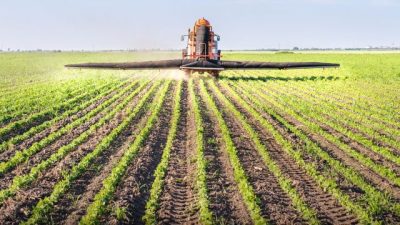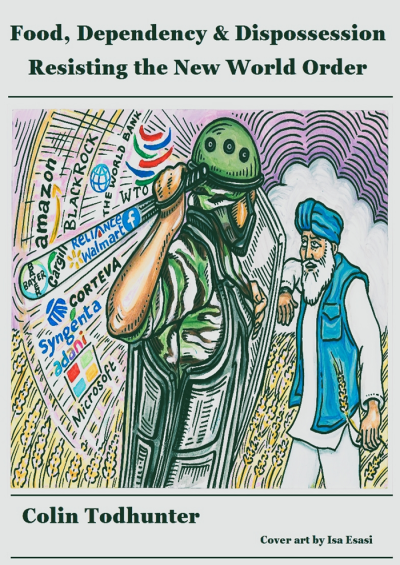The ‘Food Transition’ Is a War on Food, Farmers and Everybody Worldwide

All Global Research articles can be read in 51 languages by activating the Translate Website button below the author’s name (only available in desktop version).
To receive Global Research’s Daily Newsletter (selected articles), click here.
Click the share button above to email/forward this article to your friends and colleagues. Follow us on Instagram and Twitter and subscribe to our Telegram Channel. Feel free to repost and share widely Global Research articles.
Big Tech’s Effort to Silence Truth-tellers: Global Research Online Referral Campaign
First published on March 4, 2024
***
This article begins with a short video based on an interview with researcher Sandi Adams, who describes the plans for agriculture in the rural county of Somerset in south-west England and the UK in general. It’s an important clip because what she describes appears to be part of a wider United Nations agenda handed down by an extremely wealthy unaccountable, unelected elite.
This elite thinks it can do a better job than nature by changing the essence of food and the genetic core of the food supply (via synthetic biology and genetic engineering).
The plan also involves removing farmers from the land (AI-driven farmerless farms) and filling much of the countryside with wind farms and solar panels. Although the food system has problems that need addressing, this misguided agenda is a recipe for food insecurity that no one voted for.
Throughout the world, from the Netherlands to India, farmers are protesting. The protests might appear to have little in common. But they do. Farmers are increasingly finding it difficult to make a living, whether, for instance, because of neoliberal trade policies that lead to the import of produce that undermines domestic production and undercuts prices, the withdrawal of state support or the implementation of net-zero emissions policies that set unrealistic targets.
The common thread is that, by one way or another, farming is deliberately being made impossible or financially non-viable. The aim is to drive most farmers off the land and ram through an agenda that by its very nature seems likely to produce shortages and undermine food security.
A ‘one world agriculture’ global agenda is being promoted by the likes of the Gates Foundation and the World Economic Forum. It involves a vision of food and farming that sees companies such as Bayer, Corteva, Syngenta and Cargill working with Microsoft, Google and the big-tech giants to facilitate AI-driven farmerless farms, laboratory engineered ‘food’ and retail dominated by the likes of Amazon and Walmart. A cartel of data owners, proprietary input suppliers and e-commerce platforms at the commanding heights of the economy.
The agenda is the brainchild of a digital-corporate-financial complex that wants to transform and control all aspects of life and human behaviour. This complex forms part of an authoritarian global elite that has the ability to coordinate its agenda globally via the United Nations, the World Economic Forum, the World Trade Organization, the World Bank, the International Monetary Fund and other supranational organisations, including influential think tanks and foundations (Gates, Rockefeller etc).
Its agenda for food and farming is euphemistically called a ‘food transition’. Big agribusiness and ‘philanthropic’ foundations position themselves as the saviours of humanity due to their much-promoted plans to ‘feed the world’ with high-tech ‘precision’ farming’, ‘data-driven’ agriculture and ‘green’ (net-zero) production – with ‘sustainability’ being the mantra.
Integral to this ‘food transition’ is the ‘climate emergency’ narrative, a commentary that has been carefully constructed and promoted (see the work of investigative journalist Cory Morningstar), and net-zero ideology tied to carbon farming and carbon trading.
The ‘food transition’ involves locking farmers (at least those farmers who will remain in farming) further into a corporate-controlled agriculture that extracts wealth and serves the market needs of global corporations, carbon trading Ponzi schemes and institutional investors and speculators with no connection to farming who regard agriculture, food commodities and agricultural land as mere financial assets. These farmers will be reduced to corporate profit-extracting agents who bear all of the risks.
This predatory commercialisation of the countryside uses flawed premises and climate alarmism to legitimise the roll-out of technologies to supposedly deliver us all from climate breakdown and Malthusian catastrophe.
In society in general, we also see the questioning of official narratives discouraged, censored and marginalised. We saw this with the policies and the ‘science’ that were used to legitimise COVID-related state actions. A wealthy elite increasingly funds science, determines what should be studied, how it should be studied and how the findings are disseminated and how the technology produced is to be used.
This elite has the power to shut down genuine debate and to smear and censor others who question the dominant narrative. The prevailing thinking is that the problems humanity face are all to be solved through technical innovation determined by plutocrats and centralised power.
This haughty mindset (or outright arrogance) leads to and is symptomatic of an authoritarianism that seeks to impose a range of technologies on humanity with no democratic oversight. This includes self-transmitting vaccines, the genetic engineering of plants and humans, synthetic food, geoengineering and transhumanism.
What we see is a misguided eco-modernist paradigm that concentrates power and privileges techno-scientific expertise (a form of technocratic exceptionalism). At the same time, historical power relations (often rooted in agriculture and colonialism) and their legacies within and between societies across the world are conveniently ignored and depoliticised. Technology is not the cure-all for the destructive impacts of poverty, inequality, dispossession, imperialism or class exploitation.
When it comes to the technologies and policies being rolled out in the agriculture sector, these phenomena will be reinforced and further entrenched – and that includes illness and poor health, which have markedly increased as a result of the modern food we eat and the agrochemicals and practices already used by the corporations pushing for the ‘food transition’. However, that then opens up other money-spinning techno-fix opportunities in the life sciences sector for investors like BlackRock that invest in both agriculture and pharmaceuticals.
But in a neoliberal privatised economy that has often facilitated the rise of members of the controlling wealthy elite, it is reasonable to assume that its members possess certain assumptions of how the world works and should continue to work: a world based on deregulation with limited oversight and the hegemony of private capital and a world led by private individuals like Bill Gates who think they know best.
Whether through, for instance, the patenting of life forms, carbon trading, entrenching market (corporate) dependency or land investments, their eco-modern policies serve as cover for generating and amassing further wealth and for cementing their control.
So, it should come as little surprise that powerful people who have contempt for democratic principles (and by implication, ordinary people) believe they have some divine right to undermine food security, close down debate, enrich themselves further courtesy of their technologies and policies and gamble with humanity’s future.
For further insight into the issues discussed above, you can access the author’s two free e-books on the food system here and here.
*
Note to readers: Please click the share button above. Follow us on Instagram and Twitter and subscribe to our Telegram Channel. Feel free to repost and share widely Global Research articles.
Renowned author Colin Todhunter specialises in development, food and agriculture. He is a Research Associate of the Centre for Research on Globalization (CRG).
Featured image source
 Read Colin Todhunter’s e-Book entitled
Read Colin Todhunter’s e-Book entitled
Food, Dispossession and Dependency. Resisting the New World Order
We are currently seeing an acceleration of the corporate consolidation of the entire global agri-food chain. The high-tech/big data conglomerates, including Amazon, Microsoft, Facebook and Google, have joined traditional agribusiness giants, such as Corteva, Bayer, Cargill and Syngenta, in a quest to impose their model of food and agriculture on the world.
The Bill and Melinda Gates Foundation is also involved (documented in ‘Gates to a Global Empire‘ by Navdanya International), whether through buying up huge tracts of farmland, promoting a much-heralded (but failed) ‘green revolution’ for Africa, pushing biosynthetic food and genetic engineering technologies or more generally facilitating the aims of the mega agri-food corporations.

